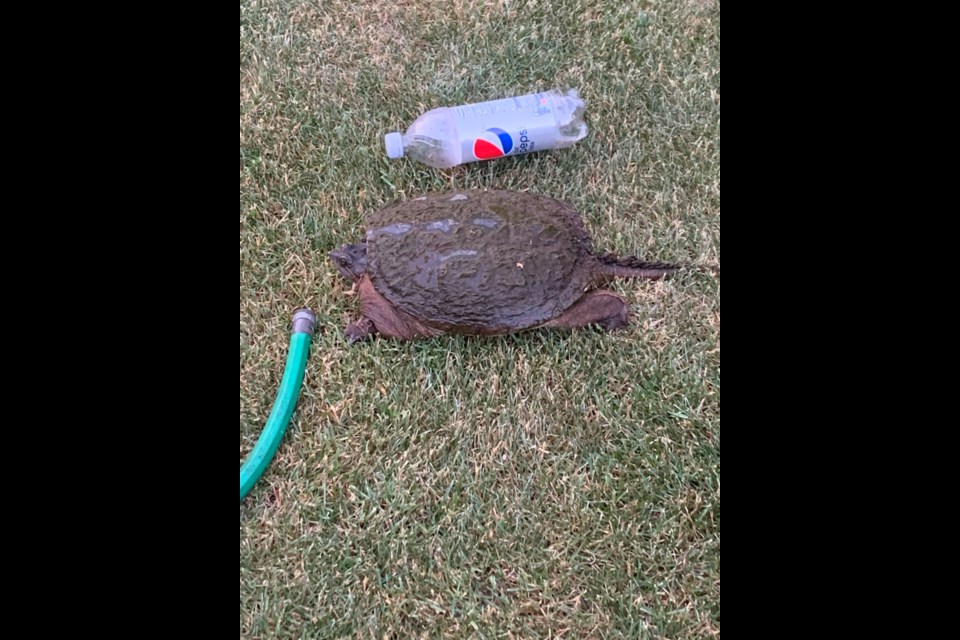WELLINGTON ‒ As road construction and turtle nesting continue to coincide, some residents are asking their neighbours to slow down and share the road with wildlife like turtles who can't race to the other side.
When Puslinch resident Peggy Geall first moved into the area 20 years ago, the exterior of their home was “completely different” but even then, she would see an occasional turtle scouting for nesting locations in the gravel driveway.
But it was only after Geall redid the exterior of their home in 2017 that ‘the turtle’ began showing up to lay her eggs over the course of three days in June.
“You would go out one day and she'd be in the back corner the next…and then she would lay her eggs in the front garden bed,” said Geall. “We just kind of wait for her to come every year and then every year she comes.”
While the event was “extraordinarily novel” at first, Geall and her husband were concerned that “something like a raccoon would dig (the turtle eggs) up and eat them.”
But Geall will never forget the first time she saw the baby turtles emerging from their nest “one by one” in early-to-mid September.
“They're so small but they move, you have no idea how fast they move,” said Geall. “Like within minutes all of the turtles had hatched and they were out of the spot.”
This is the first year Geall has welcomed a second nesting turtle into her backyard, who she originally mistook as ‘the turtle’ before checking the nesting dates in her calendar, which coincide with her brother-in-law’s birthday.
“I said to my husband, ‘She looks bigger than what I remember’... but she laid her eggs and we thought that was that,” said Geall. “But then, ‘the turtle’ came and laid her eggs in exactly the same spot at the same time that she did the year before.”
According to rare Charitable Research Reserve (Rare), female turtles often return to the same area year after year to lay their eggs.
In an attempt to mitigate human impacts on turtle populations, the conservation group has released 7,093 hatchlings and counting across Waterloo Region and Wellington County since 2017.
“Southwestern Ontario in particular has the largest diversity and highest concentrations of reptiles and amphibians in all of Canada but (it) also contains the highest concentration of people, largest network of roads, and most extensive land manipulation,” said a passage on the rare website. “Habitat fragmentation and road mortality take a large toll on the adult (turtle) population, resulting in significant declines.”
Since it can take decades for a turtle to replace itself in the wild, passionate locals like Geall and Leah-Anne Goyeau, a member of the Erin-Hillsburgh Turtle Guardians, alongside rare volunteers are working to preserve and collect nests from unsuitable but appealing nesting locations like construction sites, roadsides, and parking lots.
“Right now, there seems to be no shielding or anything to stop turtles from walking into the construction site on Trafalgar Road,” said Goyeau. “We've got traffic diverting into sensitive turtle areas… higher traffic volumes, and nothing being done to slow down the traffic.”
Goyeau is worried about the impact on turtle nesting populations like the Blandings turtle, on Trafalgar Road, near the Elora Cataract Gravity Sewer construction.
“What concerns me and a number of residents is that the turtles have lost their ability to cross (the road), particularly during mating and nesting seasons,” said Goyeau. “So these turtles lost their natural habitat and ended up in a concrete jungle inside and if they are able to climb up all this riprap, now they're facing traffic mortality.”
But in the meantime, residents like Geall will continue to open their hearts and backyards to any turtles needing a safe place to nest.
If people come across a nest, they’re advised to call a local turtle emergency hotline and let them know about it, giving them as much information as possible about the location.
If people see a turtle crossing the road, they can help it cross by picking it up and placing it on the other side.
Injured turtles can be taken to the Ontario Turtle Conservation Centre, where they have a turtle hospital.
Isabel Buckmaster is the Local Journalism Initiative reporter for GuelphToday. LJI is a federally-funded program.
